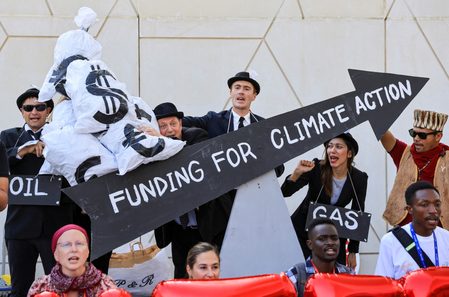SUMMARY
This is AI generated summarization, which may have errors. For context, always refer to the full article.
![[OPINION] Is limiting warming to 1.5°C still alive after COP28?](https://www.rappler.com/tachyon/2023/12/imho-cop28.png)
Has the end of the fossil fuel era begun?
This is the biggest question coming out of COP28, a conference that saw notable outcomes across different aspects of climate action. The decision specifically calls on countries to be “transitioning away from fossil fuels in energy systems in a just, orderly, and equitable manner.”
With most nations committing to tripling renewable energy (RE) capacity and doubling energy efficiency by 2030, there is a recognition of the need to scale up climate change mitigation. This is also exemplified by pledges on cutting emissions of methane, a potent greenhouse gas (GHG).
Yet like any other COP decision, it is far from a flawless agreement, especially from the perspective of vulnerable countries and communities. It not only failed to include a strong call for a fossil fuel phase-out with clear timelines; it also included references to carbon capture, use, and storage technologies, which big polluters could use as an excuse to continue emitting more GHGs and slow down RE development.
Interestingly, how fossil fuels were tackled in the Dubai climate summit followed a similar path to how the Loss and Damage (L&D) Fund was ultimately addressed last year in Egypt. Both of these issues took decades of negotiations before a clear decision was made to finally address them, due to developed nations and a few other groups either dismissing their relevance or outright preventing their inclusion in decision texts.
Yet make no mistake about it: just because “fossil fuel phase-out” was not part of the COP28 decision text does not mean it will no longer happen. The science is clear: ending humankind’s toxic relationship with fossil fuels is a necessity if we still hope to limit global warming to 1.5°C, the ideal goal under the Paris Agreement, and avoid more catastrophic loss and damage.
No matter how any country or fossil fuel corporation tries to delay it or even dispute it, the phaseout is inevitable. For the sake of current and future generations, we must use the next few years to build on this momentum, especially on pressuring developed countries to provide the one missing key that would unlock a just energy transition: sufficient climate finance.
‘Practice what you preach’
The Philippines finds itself in a critical position after the decisions made in Dubai on energy transition and L&D funding. How it responds to both parts of the COP28 agreements in the next few months would help define its course of climate action in the next few decades.
On one hand, the Philippines has a case for hosting the L&D Fund, and should be part of its Board that would be set up by January. Given the country’s status as one of the most vulnerable developing countries to the climate crisis, having either position would provide it a pivotal role in shaping the global L&D agenda for years to come.
But our government has to prove that it has the capacity to host this Fund. There must be a cost-benefit analysis that it can present to show this capacity, considering that it would have to shoulder at least some of the costs for hosting meetings and other relevant operations. More importantly, it has to prove that it can practice what it preaches across all levels.
As a huge part of the basis for the Philippines’s bid is its calls for climate justice, the government has to reflect principles of equity and social justice in the content of its positions as much as how it implements the “whole-of-society” approach at the domestic level.
That must include genuine and meaningful engagements in decision-making with Philippine civil society groups, who are among the strongest when it comes to loss and damage-related engagements across multiple levels.
This has to also be reflected in how it enacts a just energy transition moving forward. As part of its UN engagements, the country committed to reduce its GHG emissions by 75% within the current decade. However, almost this entire figure is pledged conditionally, meaning that it depends on the finance, technologies, and capacity-building support developed nations would provide.
On one hand, the Philippines has the right to demand support from these nations that caused the climate crisis in the first place. On the other hand, given the slow pace of the climate negotiations, it is important for the Philippines to show domestic initiatives in enacting a just energy transition.
What is missing from either the COP28 decision text or the Philippines’s mitigation-related plans is the strong emphasis on addressing the demand-side of the energy sector. The government needs to prioritize popularizing measures for energy conservation and efficiency not only to reduce GHG emissions, but as a means to get more communities and households directly involved in climate action.
As the government expressed support for the global pledge on tripling RE capacity at COP28, it must now translate that into policies and projects at the domestic level. Gas is not that different from coal; it is also an imported fossil fuel. If you want to understand why gas is not a “transition fuel,” as its proponents would claim it is, look no further than the current state of our energy sector that is still dependent on coal, a system that has imposed expensive electricity bills on consumers and exhibits major issues of power distribution and flexibility.
The decisions on loss and damage funding and transition away from fossil fuels bookended COP28. They embody the interconnectedness of climate action; how one issue is addressed would impact the others, how global pledges would affect national solutions.
COP28 may go down in history as the beginning of the end of the fossil fuel era, but only if countries follow through and double down on their commitments. And that is a big if.
For now, even just barely, the 1.5°C goal is still alive. – Rappler.com
John Leo Algo is the National Coordinator of Aksyon Klima Pilipinas and the Deputy Executive Director for Programs and Campaigns of Living Laudato Si’ Philippines. He is also a member of the Youth Advisory Group for Environmental and Climate Justice under the UNDP in Asia and the Pacific. He has been a climate and environment journalist since 2016.
Add a comment
How does this make you feel?







There are no comments yet. Add your comment to start the conversation.